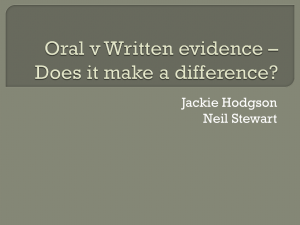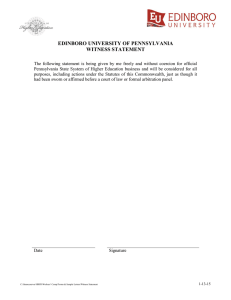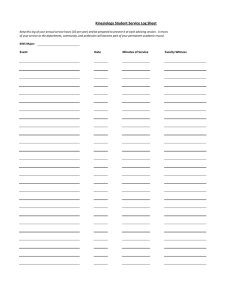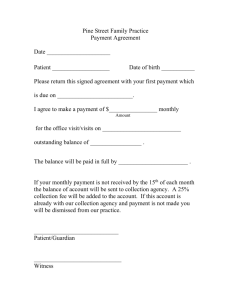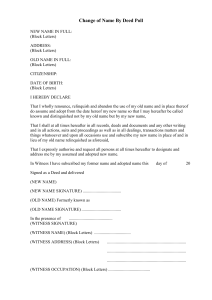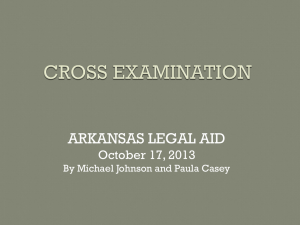Document 12820342
advertisement
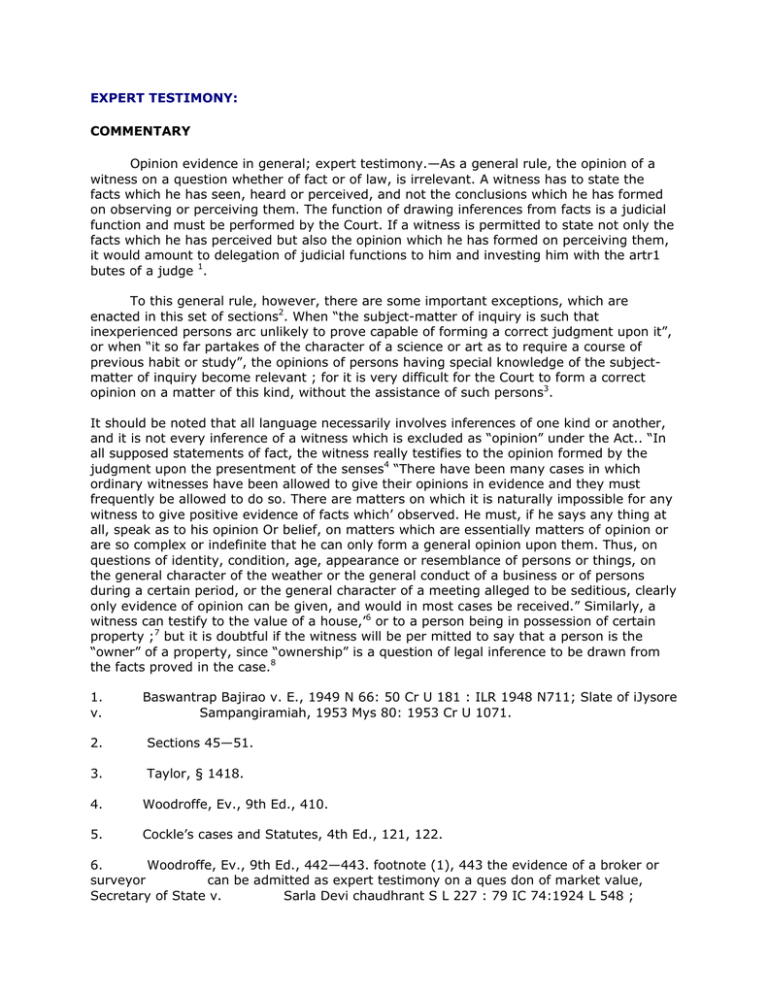
EXPERT TESTIMONY: COMMENTARY Opinion evidence in general; expert testimony.—As a general rule, the opinion of a witness on a question whether of fact or of law, is irrelevant. A witness has to state the facts which he has seen, heard or perceived, and not the conclusions which he has formed on observing or perceiving them. The function of drawing inferences from facts is a judicial function and must be performed by the Court. If a witness is permitted to state not only the facts which he has perceived but also the opinion which he has formed on perceiving them, it would amount to delegation of judicial functions to him and investing him with the artr1 butes of a judge 1. To this general rule, however, there are some important exceptions, which are enacted in this set of sections2. When “the subject-matter of inquiry is such that inexperienced persons arc unlikely to prove capable of forming a correct judgment upon it”, or when “it so far partakes of the character of a science or art as to require a course of previous habit or study”, the opinions of persons having special knowledge of the subjectmatter of inquiry become relevant ; for it is very difficult for the Court to form a correct opinion on a matter of this kind, without the assistance of such persons3. It should be noted that all language necessarily involves inferences of one kind or another, and it is not every inference of a witness which is excluded as “opinion” under the Act.. “In all supposed statements of fact, the witness really testifies to the opinion formed by the judgment upon the presentment of the senses4 “There have been many cases in which ordinary witnesses have been allowed to give their opinions in evidence and they must frequently be allowed to do so. There are matters on which it is naturally impossible for any witness to give positive evidence of facts which’ observed. He must, if he says any thing at all, speak as to his opinion Or belief, on matters which are essentially matters of opinion or are so complex or indefinite that he can only form a general opinion upon them. Thus, on questions of identity, condition, age, appearance or resemblance of persons or things, on the general character of the weather or the general conduct of a business or of persons during a certain period, or the general character of a meeting alleged to be seditious, clearly only evidence of opinion can be given, and would in most cases be received.” Similarly, a witness can testify to the value of a house,’6 or to a person being in possession of certain property ;7 but it is doubtful if the witness will be per mitted to say that a person is the “owner” of a property, since “ownership” is a question of legal inference to be drawn from the facts proved in the case.8 1. v. Baswantrap Bajirao v. E., 1949 N 66: 50 Cr U 181 : ILR 1948 N711; Slate of iJysore Sampangiramiah, 1953 Mys 80: 1953 Cr U 1071. 2. Sections 45—51. 3. Taylor, § 1418. 4. Woodroffe, Ev., 9th Ed., 410. 5. Cockle’s cases and Statutes, 4th Ed., 121, 122. 6. Woodroffe, Ev., 9th Ed., 442—443. footnote (1), 443 the evidence of a broker or surveyor can be admitted as expert testimony on a ques don of market value, Secretary of State v. Sarla Devi chaudhrant S L 227 : 79 IC 74:1924 L 548 ; Government of Bombay v. Karim Tar 7. 8. Mohomed, 33 B 325: 3 IC 273. 4 BLR 97 (FB) ; contra Ishan chunder v. Ram Lochan, 9 WR 70, 22 CJ 534, Mere opinion of a witness as to condition of certain goods based on guesswork and not on personal knowledge is not acceptable. Where certain witnesses testified that certain sluice valves lying in rows must have been in good condition though they were lying enclosed in packets, which they did not open, their opinion as to condition of valves was liable to be rejected. Similarly the statement of a Government Auctioneer made 3 years after the auction that the goods sold looked new, which was base on a superficial examination of the goods and not on record, could not be accepted.’1 A witness proving an innuendo in a libel case is merely deposing to the impression caused in his mind by the publication ; such evidence is not “opinion evidence” at all2. The opinion or impression of a witness that it appeared to him from the conduct of the mob that they had appeared there for an unlawful purpose is inadmissible to prove the object of the assembly, though statements as to what lie actually saw and heard are admissible3. Expert evidence is a weak type of evidence.4 As to evidence of character, see notes to Section55 . Matters for expert testimony ; competency to depose as an expert.— Opinions of experts become relevant only when the Court has to form an opinion upon a point of foreign law, or of science or art, or as to identity of handwriting or finger impressions. This section is, therefore, exhaustive of the matters on which expert testimony can be given, though the expression “science or art” would include almost all branches of human knowledge requiring special study, experience or training. So that a witness may be competent to depose as an expert, he must be shown to have made a special study of the subject or acquired a special experience therein. In such cases, the question is —“Is he peritus ? Is he skilled? Has he adequate knowledge ?“ An expert is a person who has special knowledge and skill in the particular calling to which the inquiry relates,’6 In law, and as applied to a witness, the term “expert” has a special significance ; and no witness is pcrmittë4 to express his opinion, unless he is an expert within the terms of Section’ 45,7 The fact that the evidence of an expert was accepted in one case is no ground for accepting his evidence in every other case.

